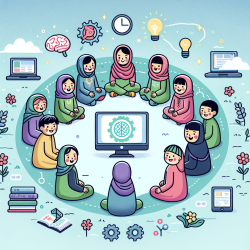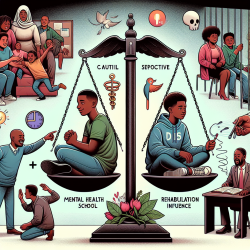Introduction
The mental health and psychosocial well-being of Afghan children have been profoundly affected by decades of conflict, political upheaval, and economic deprivation. A recent thematic review, "Afghan mental health and psychosocial well-being: thematic review of four decades of research and interventions," provides a comprehensive overview of the mental health challenges faced by Afghans and offers insights into culturally relevant interventions. For practitioners working with Afghan children, this research is a valuable resource for improving skills and outcomes through evidence-based practices.
Key Findings and Recommendations
The review highlights several critical factors influencing the mental health of Afghan children:
- High exposure to trauma and violence, both war-related and domestic.
- Significant mental health issues among women, ethnic minorities, and youth.
- Cultural understandings of psychological distress and coping strategies embedded in faith and family.
To address these challenges, the review makes four key recommendations:
- Cultural Relevance: Interventions must align with Afghan cultural values and concepts of mental health, such as the importance of faith and family relationships.
- Community-Based Support: Invest in community-based psychosocial support and evidence-based interventions that are accessible and equitable.
- Core Mental Health Services: Maintain essential mental health services at primary access points like health centers and hospitals.
- Integrated Systems of Care: Build sustainable systems that connect community-based support, psychological interventions, and clinical care.
Implementing Research Outcomes
Practitioners can leverage these findings to enhance their therapeutic approaches. For instance, integrating culturally relevant concepts into therapy sessions can foster better engagement and outcomes. Understanding the local idioms of distress and coping mechanisms allows therapists to tailor interventions that resonate with children's lived experiences.
Moreover, investing in community-based support can help bridge the gap between clinical care and the community. By training local psychosocial counselors and collaborating with community leaders, practitioners can create a supportive environment that promotes mental health and resilience.
Encouraging Further Research
While the review provides a robust foundation, there is a need for ongoing research to refine and expand these interventions. Practitioners are encouraged to engage in community-based participatory research to explore what works best in specific contexts. This approach not only enriches the evidence base but also empowers local communities to take an active role in their mental health care.
Conclusion
The thematic review underscores the importance of culturally informed and community-driven approaches to mental health care in Afghanistan. By implementing these research outcomes, practitioners can significantly improve the psychosocial well-being of Afghan children, fostering a generation that is resilient and hopeful for the future.
To read the original research paper, please follow this link: Afghan mental health and psychosocial well-being: thematic review of four decades of research and interventions.










